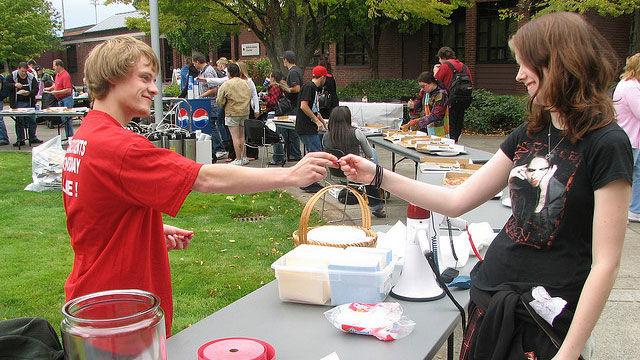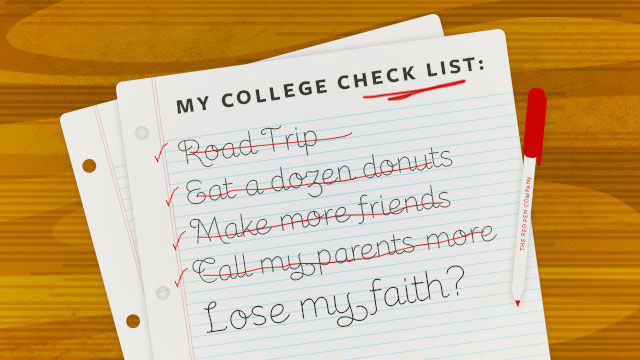|
We all know going back to school can be a mix of nerves and excitement, so here are some tidbits of advice from Cru.org to help you stay on track as you prepare.
Before you get to your campus
Once you’re on your campus
1 Comment
This week's edition of the Cru blog features an article from Cru's Monthly Magazine Worldwide Challenge. Read more from WWC at http://worldwidechallenge.org. Ben was just staring at me, waiting. “Can she sleep at your place tonight?” he had asked. “She’s fallen on hard times.” She was a thin, pierced teenager whom we had just met on the streets of Montpellier, France. We were distributing sandwiches and bottled water to the homeless, and Ben turned the tables on me. I stammered a little, “Ummm . . .” What is the right response, Jesus? What’s my responsibility to protect my kids? We only have three small bedrooms for the six of us. It underscored my struggle regarding social justice and expanding God’s kingdom. Simply said, “If a brother or sister is poorly clothed and lacking in daily food, and one of you says to them, ‘Go in peace, be warmed and filled,’ without giving them the things needed for the body, what good is that? So also faith by itself, if it does not have works, is dead” (James 2:15-17). But how important is it to focus on, as pastor and author Tim Keller says, “the quartet of the vulnerable”—the poor, the orphan, the widow and the immigrant (Zechariah 7:10)? And how do I hold that in tension with Jesus’ words to make disciples of all nations? My family had gone to France with that latter goal in mind. I grew up in a church that didn’t articulate the salvation message on Sundays, but donated money to a laundry list of social causes. Then I became involved in Cru and, during four years of college, didn’t once participate in anything resembling social action. I did learn how to give my three-minute testimony and explain the gospel. We did it faithfully— on campus, at beaches, at our workplaces. The eternal trumped the temporal and winning souls beat out offering bread. This focus was exactly opposite the church of my childhood. The pendulum had swung, and I had no grid for how or why to integrate the two. The eternal trumped the temporal and winning souls beat out offering bread. This focus was exactly opposite the church of my childhood. The pendulum had swung, and I had no grid for how or why to integrate the two. In the process, I joined a new church. One summer, the dynamic youth pastor took teenagers to Mexico. The group built a needed youth center there. Though I never said it, I wondered, Why aren’t you more clearly proclaiming the gospel? Five years out of college, I participated in an event combining social action and evangelism. Coordinated by Cru’s inner-city ministry, groups of 75 huddled in various downtown Minneapolis churches. The welcoming pastors gave some instructions, prayed and then split us up into pairs to deliver boxes—each containing a turkey, canned vegetables and fruits, a Bible and coloring books—to grateful families. Once or twice that day, we sat with a family at a kitchen table to discuss the gospel using a tract. That was 17 years ago, and this initiative continues. Last year, Cru assembled and distributed 25,181 Boxes of Love in cooperation with urban churches across America. “I think that meeting physical needs authenticates the gospel in a profound way,” says Cru leader Dave Mikesell. “It says, ‘I care that you have food in your stomach and that you go to school, but I also care about your eternity.’” And then came the tide that turned our campus leaders toward this view. I was in the fog of raising four kids ages 6 and under when a tsunami hit southern Asia in December 2004. We got an email saying Cru missionary Chip Scivicque was organizing students for relief trips. Chip and his family had lived in Thailand for 12 years, sharing Christ daily and seeing little response. In 1983, the country was characterized as 95 percent Buddhist and .05 percent Christian. “To go again in 2005 and experience the depth of the openness of the gospel when we brought in tangible help,” says Chip with emotion, “was amazing.” The provinces most affected by the tsunami went from three churches to 65 within 11 months! On the heels of tsunami relief, Hurricane Katrina hit America’s Gulf Coast in August 2005. Again Cru jumped in. More than 17,000 students and Cru staff members eventually showed up, cleaning around 3,000 homes and schools, distributing more than 3,000 Bibles and articulating the gospel 4,000 times. With unexpected eternal kickbacks. Kelly Woodman traveled to New Orleans from Greeley, Colorado, with 140 students, half of them non-Christians. “One student, Marla, who gave her life to Jesus after the trip, admitted she would have never cared to know about Jesus before seeing that believers really do care for the needs of the destitute,” remembers Kelly. After the Katrina cleanup, Cru leaders continued to look for ways to combine the good news with good deeds. And so it went for me, living in an international setting, no longer sheltered from the vulnerable. Like the adults at a mental health day-care facility just 100 yards from our urban townhouse in southern France. I would pass them as I biked my kids to school and back. I felt compelled to greet one stone-faced man daily. But my good intentions often turned to discomfort. His responses felt creepy. I feared he might follow me home. It wasn’t so much fear that kept me from approaching the prostitutes that gathered at night under the Romanstyled aqueduct three blocks from our home. I felt sad for their situation. But honestly, I didn’t know how to help and just hoped that my adolescent sons wouldn’t glimpse their come-hither poses. That indifference gets shaken as I read Keller’s Generous Justice: “[W]hen the Spirit enables us to understand what Christ has done for us, the result is a life poured out in deeds of justice and compassion for the poor.” But does demonstration always have to accompany proclamation? In France, most students come from middle-class backgrounds, and the government pays their expenses. Their physical needs are few. Proclamation of the gospel involves first deliberately addressing their deeply entrenched intellectual objections to God and the Bible. However, when those same skeptical students participate in an outreach to the needy, like handing out sandwiches, it cracks open a door to witness the love of a real God in action. Little by little, I’m seeing that words and deeds marry beautifully. And their consummation surely invites a more diverse crowd to the wedding feast in heaven. But if today Ben asked me to harbor the homeless girl, I’d still hesitate. Intellectually, I am for social justice, but emotionally, I’m uncertain how much it should cost me. You can contact the writer at [email protected]. Take Away: >How have you done with holding gospel proclamation and social justice in tension with one another? Invite a non-Christian friend to participate in social action with you. For more articles on the subject, check outwww.crupressgreen.com under the "Gospel in Action" subheading. This week's post comes from Ashley Tripp, a University of Alabama alumni, who posted for Cru.org. As you read, ask yourself, "Do I need to hear this?" or "Is there an incoming freshman I could encourage this with?"
A growing trend reveals that college freshmen aren’t just preparing a goodbye speech to their families, but to their faith as well. Conor Friedersdorf writes in The Atlantic, “[Freshmen] leave their church, the community incentives to attend it, and the watchful eye of parents who get angry or make them feel guilty when they don’t go to services or stray in their faith. Suddenly they’re surrounded by dorm mates of different faiths or no faith at all.” However, because I attended a university in the heart of the Bible Belt, it came as no surprise to see many college students dressed in their Sunday best for church. But what did come as a shock to me was how these church attenders behaved the remaining six days of the week. Attending church doesn’t make one a Christian, and yet, this is a lie many college students believe. Even as someone who grew up in a Christian family, I struggled too with living out my faith instead of saving it for Sundays. Certain barriers pushed me away from experiencing the fullness of my relationship with Jesus. The majority of my first semester revolved around sorority life, school, dance and Alabama football. I didn’t get plugged in a campus ministry because I would make up excuses. I was becoming a part of the growing trend of saying goodbye to my faith. Who knew I would need a spiritual survival kit in addition to my freshman survival kit? It wasn’t until the spring of my sophomore year that I settled down and became invested with Bama Cru, Cru’s campus ministry at Alabama. At Bama Cru, staff member Jeff Norris is “convinced that the greatest need that incoming college freshmen have is to explore and develop the spiritual area of their life.” “One of the best ways to do this is in the context of community,” Jeff said. “Often times, freshmen are curious about faith and want to develop their spiritual life, but they don’t know where to start or who to start with.” How not to lose your faith in college Pursuing a relationship with Jesus and living out one’s faith seemed to be a thing of the past as I looked around at the brokenness on campus. Most students don’t come into college thinking they’ll lose their faith. But then to-do lists pile up, and it becomes a backburner. However, I found that my faith actually strengthened during college once I became more intentional about my activities. These are a couple of things I found helpful: 1. Get Plugged Into a Ministry Whatever your theological background, get plugged in with a group of solid believers who love God and love people. I chose to become involved with Bama Cru, Campus Crusade for Christ’s chapter at Alabama. Surrounding myself with a community of believers, I created relationships and gained a deeper understanding of the Christian faith. It wasn’t until college when I realized Christianity was not just a certain religion, but also a relationship with Jesus. 2. Take On a Leadership Role Are you passionate about your faith? Seek after a leadership role on campus. I became my sorority’s chaplain and spread the love of Jesus Christ among my Gamma Phi Beta sisters. Some of my friends from Bama Cru led a six-week video series from Matt Chandler on dating, relationships and sex based off of the book of Song of Songs in the Bible. Open to anyone, the series was held at different sorority houses each week. In addition, my sorority collaborated with another sorority for a Bible study on Marian Jordan’s book, “Radiance.” 3. Attend a Summer Project The summer before my senior year in college, I went on Greek Summit, a summer project led by Cru staff in Destin, Fla. There, I met over 100 college students from across the nation. The purpose of the mission trip was to learn how live out one’s faith and how to become an influence in your sorority or fraternity. It was probably the best two weeks of my college career. I learned a great deal about the Gospel and what it looks like to share one’s faith with your sorority sisters. 4. Make it a Priority Reading the Bible and attending church is what “Culture Christianity” tells society is the right way to practice Christianity. I’ve discovered it’s a daily walk and a personal relationship. When I wake up, I do my best to make it a priority to spend time with God, not in a routine manner or because it’s my duty as a Christian, but because God is my reason for living. It’s almost like brushing your teeth. Do you brush your teeth because it’s a part of your routine, or do you do it so that your teeth won’t rot away? With enough passion and perseverance, it is possible to live out your faith into your college experience.
|
AuthorA community where Jesus Christ captures hearts, transforms lives, and launches men and women into a life long adventure with Him. Archives
June 2015
Categories
All
|



 RSS Feed
RSS Feed